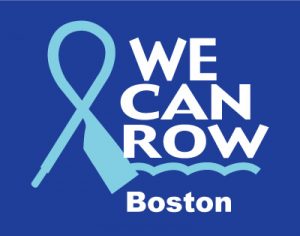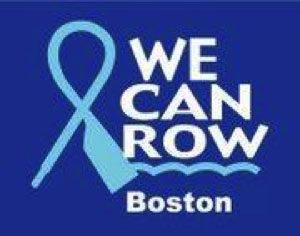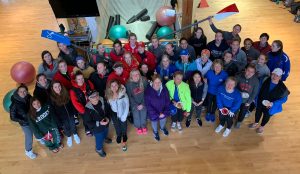These remarks were delivered at the 6th Annual Women’s Row at Community Rowing, Inc. on September 20th, 2015
I’m Vickery Kehlenbeck, and I row with a GS2 group at here at CRI. Tracey has asked me to take a few minutes to tell you what rowing means to me.
*******************************************************************************
No one is happy to get a cancer diagnosis. It’s not a “gift”. But that doesn’t mean you can’t be grateful for good things you wouldn’t otherwise have experienced. And to say that I’m grateful for rowing is a huge understatement.
I was diagnosed with breast cancer in the spring of 2011, at age 57. I had finished treatment – the whole megillah – surgery, chemo and radiation – by the following January. My physical recovery was on schedule, but I was discovering that the emotional recovery would take much much longer. They tell you this will happen, but it’s difficult to comprehend how hard the process is until you get there.
Like many cancer patients, I felt I had lost control over my body and indeed over my life – knowing there are probably undetectable cancer cells still floating around in my body, the possibility of new cancers, recurrence or metastasis – those were, and are, very scary. I lost any sense of trust in my body, in my future, both whether I had one as well as what it might look like, in my post-chemo brain, even in knowing who my friends were, since some people I thought were friends disappeared, while mere acquaintances stepped up. If that was the “new normal”, I wasn’t interested! But I thought if I tried to do something new and challenging, I might able to look forward to being strong and engaged once again. Survival is a great thing, but I wanted to move beyond surviving to living.
Enter WeCanRow, a national wellness program specifically designed for breast cancer survivors, started here in Boston by Holly Metcalfe. My father rowed, my brother rowed and my son coxed, so I had spent a lot of time on muddy riverbanks, and when someone suggested WeCanRow it seemed fated – maybe rowing was in my genes! I never would have dared take a class at CRI (shows you how little I knew about CRI at that point) but WeCanRow looked like a good place to find a new but gentle challenge.
Fast forward – once I got in a shell I was hooked. With the support of great coaches and women who understood what I was going through, I felt at home in a boat and couldn’t get enough time on the river. That fall I came to this wonderful gathering for the first time (now one of my favorite events of the year) and was thrilled to find myself part of a larger community – I was a ROWER! The next year when I retired I joined CRI and Avalon, happy for more time on the water and new challenges like coxing and racing.
Without my diagnosis I never would have tried a new sport, being too busy with the rest of life. But three and a half years later rowing has reconnected me with the pre-cancer Vickery, and even with the pre-raising kids and practicing law Vickery. The one who played D-1 sports, said “sure – let’s go for it!”, organized professional events, tried parasailing, was one of the first women at my historically male university and was often the only woman in the conference room. I’ve regained my enthusiasm for trying things I’ve never done before or am afraid of – like going up in a hot air balloon, or even, last spring, coaching in a high school crew program, which was great fun except for operating that damn launch.
My future is no more certain now, and a flashback of anxiety or panic jumps up to bite me sometimes when I least expect it, but rowing is helping me come to terms with the uncertainty. To borrow an image, the disease has become like a shadow – I know it’s always with me, I can’t make it go away, but I don’t have to look at it all the time!
But why is rowing such a perfect fit for those dealing with such shadows? As you all know, rowing, unlike the field sports I played years ago, requires everyone in the boat to work as a single unit – both physically and mentally – to do the same thing at the same time, over and over again. I pace my stroke watching the back of the person in front of me, trusting that the person behind me will do the same with my back. Holly well understood how the demands inherent in rowing – the focus on keeping your “head in the boat”, the discipline, the structure, as well as the exercise, would enable cancer survivors to benefit physically and emotionally. To look at that shadow less often.
Through rowing I have relearned to trust other people, to allow them to trust me, to believe once again that my mind is clear and that my body will respond when I ask it to do more, and to trust that my rowing friends, and you are many, will stay with me “in sickness and in health”, if you will. These lessons continue to sustain me in the on-going transition from surviving to living. And for that, I am and will always be profoundly grateful.


